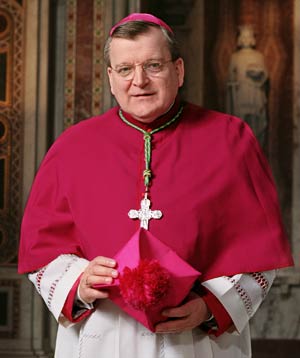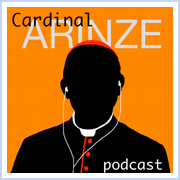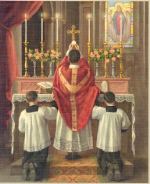Matthew 4:1-11Jesus Fasts and Is Tempted[1] Then Jesus was led up by the Spirit into the wilderness to be tempted by the devil. [2] And He fasted forty days and forty nights, and afterward He was hungry. [3] And the tempter came and said to Him, "If You are the Son of God, command these stones to become loaves of bread." [4] But He answered, "It is written, 'Man shall not live by bread alone, but by every word that proceeds from the mouth of God.'"
[5] Then the devil took Him to the holy city, and set Him on the pinnacle of the temple, [6] and said to Him, "If you are the Son of God, throw Yourself down; for it is written, 'He will give His angels charge of you,' and 'On their hands they will bear you up, lest you strike your foot against a stone'" [7] Jesus said to him, "Again it is written, 'You shall not tempt the Lord your God.'" [8] Again, the devil took Him to a very high mountain, and showed Him all the kingdoms of the world
and the glory of them; [9] and he said to Him, "All these I will give You, if You will fall down and worship me." [10] Then Jesus said to him, "Begone, Satan! for it is written, 'You shall worship the Lord your God and Him only shall you serve.'"
[11] Then the devil left Him, and behold, angels came and ministered to Him.
**************
Commentary:
1. Jesus, our Savior, allowed Himself to be tempted because He so chose; and He did so out of love for us and to instruct us. However, since He was perfect He could only be tempted externally. Catholic teaching tells us that there are three levels of temptation: 1) suggestion, that is, external temptation, which we can undergo without committing any sin; 2) temptation in which we take a certain delight, whether prolonged or not, even though we do not give clear consent; this level of
temptation has now become internal and there is some sinfulness in it; 3) temptation to which we consent; this is always sinful, and since it affects the deepest part of the soul, it is definitely internal. By allowing Himself to be tempted, Jesus wanted to teach us how to fight and conquer our temptations. We will do this by having trust in God and prayer, with the help of God's grace and by having fortitude.
Jesus' temptations in the desert have a deep significance in salvation history. All the most important people throughout sacred history were tempted--Adam and Eve, Abraham, Moses, and the Chosen People themselves. Similarly with Jesus. By rejecting the temptations of the devil, our Lord atones for the falls of those who went before Him and those who come after Him. He is an example for us in all the temptations we were subsequently to have, and also for the battles between the Church and the power of the devil. Later Jesus teaches us in the "Our Father" to
ask God to help us with His grace not to fall at the time of temptation.
2. Before beginning His work as Messiah, that is, before promulgating the New Law or New Testament, Jesus prepares Himself by prayer and fasting in the desert. Moses acted in the same way before proclaiming, in God's name, the Old Law on Mount Sinai (Exodus 34:28). Elijah, too, journeyed for forty days in the desert to fulfill the Law (1 Kings 19:5-8).
The Church follows Jesus' footsteps by prescribing the yearly Lenten fast. We should practice Lent each year with this spirit of piety. "It can be said that Christ introduced the tradition of forty days fast into the Church's liturgical year, because He Himself 'fasted forty days and forty nights' before beginning to teach. By this Lenten fast the Church is in a certain sense called every year to follow her Master and Lord if she wishes to preach His Gospel effectively" ([Pope] John Paul II, "General Audience", 28 February 1979). In the same way, Jesus' withdrawal into the desert invites us to prepare ourselves by prayer and penance before any important decision or action.
3. Jesus had fasted forty days and forty nights. Naturally He is very hungry and the devil makes use of this opportunity to tempt Him. Our Lord rejects the temptation and in doing so He uses a phrase from Deuteronomy (8:3). Although He could do this miracle, He prefers to continue to trust His Father since performing the miracle is not part of His plan of salvation. In return for this trust, angels come and minister to Him (Matthew 4:11).
Miracles in the Bible are extraordinary and wonderful deeds done by God to make His words or actions understood. They do not occur as isolated outpourings of God's power but rather as part of the work of Redemption. What the devil proposes in this temptation would be for Jesus' benefit only and therefore could not form part of the plan for Redemption. This suggests that the devil, in tempting Him in this way, wanted to check if Jesus is the "Son of God". For, although he seems to know about the voice from Heaven at Jesus' baptism, he cannot see how the Son of God could be hungry. By the way He deals with the temptation, Jesus teaches us that when we ask God for things we should not ask in the first place for what we can obtain by our own efforts. Neither should we ask for what is exclusively for our own convenience, but rather for what will help towards our holiness or that of others.
4. Jesus' reply is an act of trust in God's fatherly providence. God led Him into the desert to prepare Him for His messianic work, and now He will see to it that Jesus does not die. This point is underlined by the fact that Jesus' reply evokes Deuteronomy 8:3, where the sons of Israel are reminded how Yahweh fed them miraculously with manna in the desert. Therefore, in contrast to the Israelites who were impatient when faced with hunger in the desert, Jesus trustingly leaves His
well-being to His Father's providence. The words of Deuteronomy 8:3, repeated here by Jesus, associate "bread" and "word" as having both come from the mouth of God: God speaks and gives His Law; God speaks and makes manna appear as food.
Also, manna is commonly used in the New Testament (see, for example, in 6:32-58) and throughout Tradition as a symbol of the Eucharist.
The Second Vatican Council points out another interesting aspect of Jesus' words when it proposes guidelines for international cooperation in economic matters: "In many instances there exists a pressing need to reassess economic structures, but caution must be exercised with regard to proposed solutions which may be untimely, especially those which offer material advantages while militating against man's spiritual nature and advancement. For 'man shall not live by bread alone, but by
every word that proceeds from the mouth of God'" ("Gaudium Et Spes", 86).
5. Tradition suggests that this temptation occurred at the extreme southern corner of the temple wall. At this point, the wall was at its highest, since the ground beneath sloped away steeply to the Cedron River. Looking down from this point one could easily get a feeling of vertigo.
St. Gregory the Great ("In Evangelia Homiliae", 16) says that if we consider how our Lord allowed Himself to be treated during His passion, it is not surprising that He allowed the devil also to treat Him as he did.
6. "Holy Scripture is good, but heresies arise through its not being understood properly" (St. Augustine, "In Ioann. Evang., 18, 1). Catholics should be on their guard against arguments which, though they claim to be founded on Scripture, are nevertheless untrue. As we can see in this passage of the Gospel, the devil can also set himself up at times as an interpreter of Scripture, quoting it to suit himself. Therefore, any interpretation which is not in line with the teaching
contained in the Tradition of the Church should be rejected.
The error proposed by a heresy normally consists in stressing certain passages to the exclusion of others, interpreting them at will, losing sight of the unity that exists in Scripture and the fact that the faith is all of a piece.
7. Jesus rejects the second temptation as He did the first; to do otherwise would have been to tempt God. In rejecting it, He uses a phrase from Deuteronomy (6:16): "You shall not put the Lord your God to the test". In this way He alludes to the passage in Exodus where the Israelites demand a miracle of Moses. The latter replies, "Why do you put the Lord to the proof?"
To tempt God is the complete opposite of having trust in Him. It means presumptuously putting ourselves in the way of unnecessary danger, expecting God to help us by an exceptional use of His power. We would also tempt Him if, by our unbelief and arrogance, we were to ask Him for signs or proof. The very first lesson from this passage of the Gospel is that if ever a person were to ask or demand extraordinary proofs or signs from God, he would clearly be tempting Him.
8-10. The third temptation is the most pseudo-messianic of the three: Jesus is urged to appropriate to Himself the role of an earthly messianic king of the type so widely expected at the time. Our Lord's vigorous reply, "Begone, Satan!" is an uncompromising rejection of an earthly messianism--an attempt to reduce His transcendent, God-given mission to a purely human and political use. By His attitude, Jesus, as it were, rectifies and makes amends for the worldly views of the people of Israel. And, for the same reason, it is a warning to the Church, God's true Israel, to remain faithful to its God-given mission of salvation in the world. The Church's pastors should be on the alert and not allow themselves to be deceived by this temptation of the devil.
"We should learn from Jesus' attitude in these trials. During His life on earth He did not even want the glory that belonged to Him. Though He had the right to be treated as God, He took the form of a servant, a slave (cf. Philippians 2:6-7). And so the Christian knows that all the glory is due to God and that he must not make use of the sublimity and greatness of the Gospel to further his own interests or human ambitions.
"We should learn from Jesus. His attitude in rejecting all human glory is in perfect balance with the greatness of His unique mission as the beloved Son of God who takes flesh to save men [...]. And the Christian, who, following Christ, has this attitude of complete adoration of the Father, also experiences our Lord's loving care: 'because he cleaves to Me in love, I will deliver him; I will protect
him, because he knows My name' (Psalm 90:14)" ([St] J. Escriva, "Christ Is Passing By", 62).
11. If we struggle constantly, we will attain victory. And nobody is crowned without having first conquered: "Be faithful unto death, and I will give you the crown of life" (Revelation 2:10). By coming to minister to Jesus after He rejects the temptations, the angels teach us the interior joy given by God to the person who fights energetically against the temptations of the devil. God has given us also powerful defenders against such temptations--our guardian angels, on whose aid we
should call.
*******************
Source: "The Navarre Bible: Text and Commentaries". Biblical text taken from the Revised Standard Version and New Vulgate. Commentaries made by members of the Faculty of Theology of the University of Navarre, Spain. Published by Four Courts Press, Kill Lane, Blackrock, Co. Dublin, Ireland.
Reprinted with permission from Four Courts Press and Scepter Publishers, the U.S. publisher.










